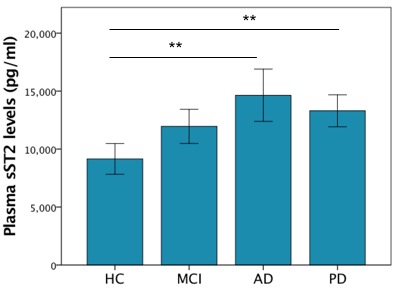Session Information
Date: Wednesday, September 25, 2019
Session Title: Cognition and Cognitive Disorders
Session Time: 1:15pm-2:45pm
Location: Agora 3 East, Level 3
Objective: As plasma IL-33 levels are too low to accurately quantify, we measured plasma sST2 as a surrogate marker for IL-33 in samples from healthy controls (HC) and patients with MCI, Alzheimer’s disease (AD) and PD. The relationship between plasma sST2 and cognitive measures was investigated.
Background: Interleukin 33 (IL-33) is a member of the interleukin1 cytokine family, with soluble ST2 (sST2) acting as its decoy receptor. IL-33 is expressed in oligodendrocytes and astrocytes and plays a role in healing and repair in the CNS, while ST2 is expressed in microglia and astrocytes. Limited studies have investigated their role in neurodegeneration – pathological studies report decreased IL-33 and increased ST2 expression in AD brains compared to controls, while higher serum sST2 levels were reported in mild cognitive impairment (MCI). No study has yet investigated sST2 in Parkinson’s disease (PD).
Method: Plasma sST2 levels were measured using ELISA in 156 subjects (21 HC, 46 MCI, 38 AD, and 50 PD). PD patients were in the early disease stage (disease duration £1 year). Five cognitive domains were assessed: episodic memory, attention/working memory, executive, visuospatial and language. In PD, motor function assessed using the Unified Parkinson’s disease rating scale (UPDRS).
Results: Plasma sST2 was significantly different across disease groups (p=0.002). After correcting for multiple comparisons, AD and PD showed significantly higher sST2 levels compared to HC (p=0.001 and p=0.005, respectively). Across cognitive domains, higher levels of sST2 associated with worse episodic memory scores in MCI (r=-0.389, p=0.025) and PD (r=-0.294, p=0.038) patients, but did not show significant association with UPDRS Part III motor scores (r=0.093, p=0.531) in PD patients.
Conclusion: We found significantly higher plasma sST2 levels in PD and AD patients compared to HC. Interestingly, higher sST2 levels correlated with worse episodic memory in patients with early PD, but not in AD patients. These results implicate that ST2/IL-33 signalling may play an important role in disease modulation, particularly in PD cognition.
To cite this abstract in AMA style:
ASL. Ng, YJ. Tan, ACW. Yong, BYX. Wong, ZH. Lu, SYE. Ng, SKS. Ting, S. Hameed, L. Zeng, N. Kandiah, WL. Au, LCS. Tan. Plasma Soluble ST2 (sST2) levels are Higher in Neurodegeneration and Associate with PD Cognition [abstract]. Mov Disord. 2019; 34 (suppl 2). https://www.mdsabstracts.org/abstract/plasma-soluble-st2-sst2-levels-are-higher-in-neurodegeneration-and-associate-with-pd-cognition/. Accessed January 30, 2026.« Back to 2019 International Congress
MDS Abstracts - https://www.mdsabstracts.org/abstract/plasma-soluble-st2-sst2-levels-are-higher-in-neurodegeneration-and-associate-with-pd-cognition/

